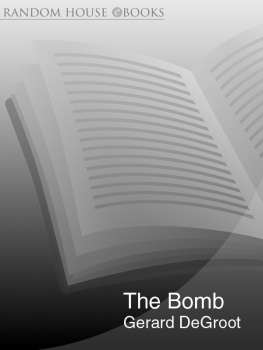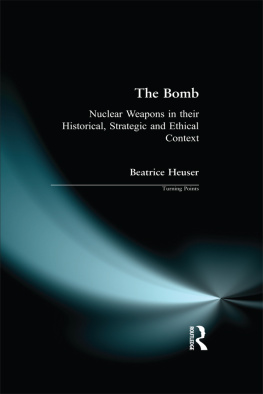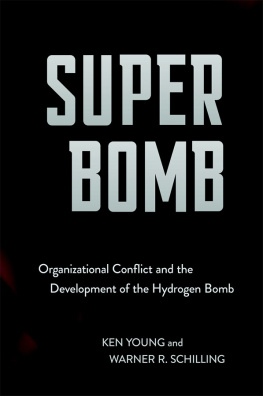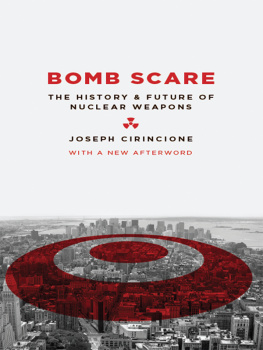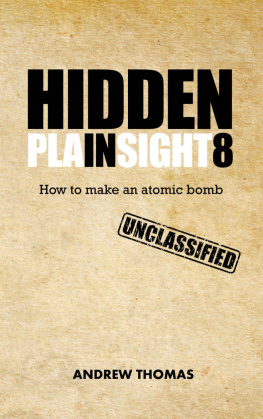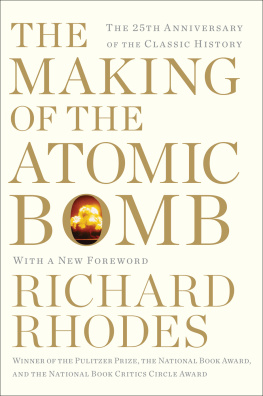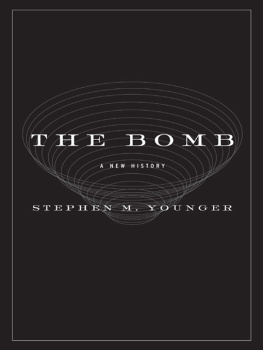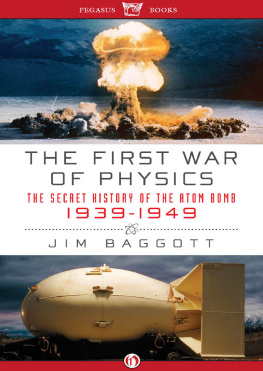THE BOMB
A Life
Gerard J. DeGroot
www.vintage-books.co.uk
About the Author
Born in California, Gerard DeGroot is Professor of Modern History at the University of St Andrews. He has written eight books on aspects of twentieth-century war, and is a regular columnist and reviewer for Scotland on Sunday.
This ebook is copyright material and must not be copied, reproduced, transferred, distributed, leased, licensed or publicly performed or used in any way except as specifically permitted in writing by the publishers, as allowed under the terms and conditions under which it was purchased or as strictly permitted by applicable copyright law. Any unauthorised distribution or use of this text may be a direct infringement of the authors and publishers rights and those responsible may be liable in law accordingly.
Version 1.0
Epub ISBN 9781446449615
www.randomhouse.co.uk
Published by Jonathan Cape 2004
2 4 6 8 10 9 7 5 3 1
Copyright Gerard DeGroot 2004
Gerard DeGroot has asserted his right under the Copyright, Designs and Patents Act 1988 to be identified as the author of this work
This book is sold subject to the condition that it shall not, by way of trade or otherwise, be lent, resold, hired out, or otherwise circulated without the publishers prior consent in any form of binding or cover other than that in which it is published and without a similar condition including this condition being imposed on the subsequent purchaser
First published in Great Britain in 2004 by Jonathan Cape
Random House, 20 Vauxhall Bridge Road, London SW1V 2SA
Random House Australia (Pty) Limited
20 Alfred Street, Milsons Point, Sydney,
New South Wales 2061, Australia
Random House New Zealand Limited
18 Poland Road, Glenfield,
Auckland 10, New Zealand
Random House South Africa (Pty) Limited
Endulini, 5a Jubilee Road, Parktown 2193, South Africa
The Random House Group Limited Reg. No. 954009
www.randomhouse.co.uk
A CIP catalogue record for this book is available from the British Library
ISBN 0-224-06232-8
Contents
To Dr Steve Greene, one-time neighbour of Klaus Fuchs, but, more importantly, someone who reminds me, every day, through my daughter Natalie, that scientists have also brought immense good.
Also by Gerard DeGroot
Douglas Haig: 18611928
Liberal Crusader: The Life of Sir Archibald Sinclair
Blighty: British Society in the Era of the First World War
A Noble Cause?: America and the Vietnam War
The First World War
Edited volumes
Military Miscellany
Student Protest
A Soldier and a Woman
Preface
NOTHING THAT MAN has made is bigger than the Bomb. If your mountain is not in the right place, drop us a postcard, Edward Teller, the father of the H-Bomb, once quipped. To the nuclear wizards, the Bomb was not just a weapon, it was a tool for re-shaping the earth. Though the opportunities to move mountains proved few, a restructuring of the world did take place.
Many atomic physicists hoped that the Bomb would be big enough to destroy war itself. The idea seems nave. The atomic age has not, after all, been very peaceful. But the striking fact of the Cold War is that it remained cold. Though tens of thousands of nuclear weapons were made, after Nagasaki, none were used in anger. We cling to the hope that the bigness of the Bomb continues to be a deterrent against its use.
The sheer size of the Bomb is what makes the topic so attractive. It killed hundreds of thousands of people in a matter of seconds, condemned others to a lingering death and made vast tracts of land unfit for life. It has dominated the minds of those condemned to live in the atomic age, exerting its influence not just on politics, but also throughout popular culture.
Impressive books have been written on the Manhattan Project, the H-bomb, the Cuban Missile Crisis, nuclear deterrence and the disarmament negotiations. The detail of those books runs deeper than has been possible here. But detail was not my primary aim; I wanted to present the entire life of the Bomb in one volume in order to provide a sense of its size and a feeling for its ubiquity. All the main characters are here Oppenheimer, Teller, Kurchatov, Sakharov, Truman, Stalin, Churchill, Kennedy, Khrushchev, Reagan and Gorbachev. But Ive also included minor characters whose lives were affected by the Bomb: the anonymous technicians of the Manhattan Project, the cancer-ridden downwinders in Utah, the genetically damaged communities of Chelyabinsk, the campers of Greenham Common, the displaced peoples of Bikini. Like a great Hollywood epic, this book has a cast of thousands.
The bigness of the Bomb is both a blessing and a curse. I could have written a much bigger book, but I quickly exhausted the tolerance of a generous editor. I am tormented by what I have left out, not just because some areas deserve deeper discussion, but also because so many more good stories remain to be told. In deciding what went in and what got cut I made a strategic decision which I hope will make sense to the reader. It is my sincere feeling that the really big decisions about the Bomb were all made by around the time of the Cuban Missile Crisis. The revolt against the Bomb had evaporated, the H-Bomb was made, tests went underground and the superpowers accepted the doctrine of mutually assured destruction. The period after 1962 was characterized by the rapid progression down a road called proliferation which had been paved long before. The world (or at least most of it) had stopped worrying and had learned to love the Bomb.
This thesis (if we can call it that) explains why Ive devoted a great deal more attention to the debates of the 1950s than to those of the 1970s and 1980s. In the 1950s hugely important decisions were made about the shape of the atomic age. Two decades later, that shape had set fast and debate took on a repetitive character; rather like dancers who persist in dancing only the Charleston, but in ever more frenzied a manner. To me, the endless talk over SALT and START seems insignificant compared to the really important decisions made from 1940 to 1962. I know that some diplomatic historians will howl in protest, but I dont consider the arms reduction talks all that important in the lifetime of the Bomb. The puny efforts to bring proliferation under control were always dwarfed by the MAD giant of deterrence. Once the atomic powers decided that the best protection against a Bomb was another Bomb, any talk of arms reduction was rendered irrevocably futile. Real disarmament had to await removal of the animosities which had originally inspired proliferation.
The bigness of the Bomb also explains my treatment of the various anti-nuclear campaigns. Im struck by how solid was the faith in the Bomb as an instrument of security, not just among politicians, but also among ordinary people. For this reason, the peace movements often seem feeble and sometimes self-indulgent. I admire their devotion but stand in awe at their stubborn denial of futility. The Bomb is a horrible weapon, a manifestation of the worst aspects of human nature. But it cannot be un-invented, and unilateral disarmament by a few countries will not necessarily make the world a safer place.

